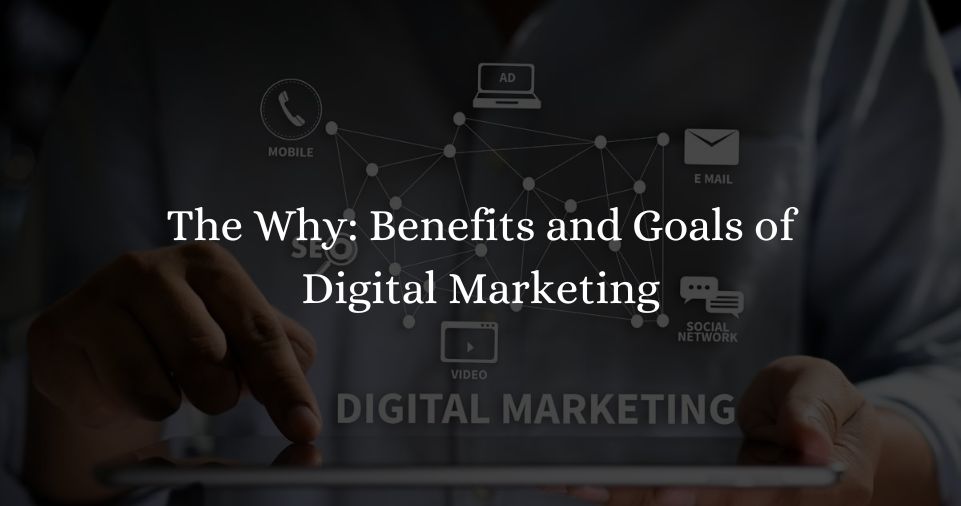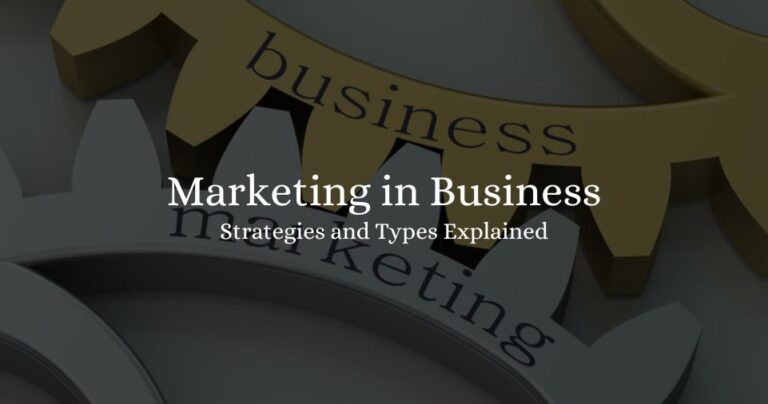The Who, What, Why, & How of Digital Marketing 2023
Are you struggling to navigate the ever-evolving world of digital marketing? Do terms like SEO, PPC, and social media algorithms leave you feeling overwhelmed and unsure of where to begin? If so, you’re not alone. In today’s fast-paced digital landscape, understanding the ins and outs of effective marketing strategies can be a daunting task.
But fear not! In this comprehensive guide, we’ll dive deep into the world of digital marketing and equip you with the knowledge and tools you need to thrive in this digital era. Whether you’re a business owner, a marketing professional, or simply someone interested in expanding your digital marketing skills, we’ve got you covered.
Digital Marketing: The Who, What, Why, & How
At its core, digital marketing encompasses a wide range of strategies and techniques aimed at promoting products, services, and brands in the digital space. From search engine optimization (SEO) to social media advertising, digital marketing offers endless possibilities for reaching and engaging with your target audience.
Throughout this guide, we’ll unravel the complexities of digital marketing and provide you with actionable insights and tips to help you build a successful online presence. We’ll explore the who, what, why, and how of digital marketing, leaving no stone unturned.
But before we delve into the nitty-gritty details, let’s address the pain point. The digital marketing landscape is constantly evolving, making it challenging to keep up with the latest trends and strategies. This lack of knowledge and understanding can hinder your ability to reach your target audience effectively, resulting in missed opportunities for growth and success.
However, fret not! By the end of this guide, you’ll have a solid grasp of the fundamental concepts, best practices, and strategies that will enable you to navigate the digital marketing landscape with confidence and achieve your business goals
So, without further ado, let’s dive into the exciting world of digital marketing and unlock the secrets to reaching and captivating your audience in the digital realm.
The Who: Identifying Your Target Audience

To effectively navigate the vast landscape of digital marketing, one must first understand the importance of defining a target audience and creating buyer personas. By identifying and understanding your ideal customers, you can tailor your marketing efforts to resonate with their needs, preferences, and behaviors.
Research techniques play a crucial role in gaining insights into your audience. Start by analyzing demographics such as age, gender, location, and income levels. Utilize online tools and surveys to gather data and uncover valuable information about their interests, motivations, and pain points. This in-depth understanding will empower you to create targeted and personalized marketing messages that truly connect with your audience.
Imagine you’re a business owner who sells premium fitness equipment. Your research reveals that your target audience consists mainly of health-conscious individuals aged 25-40, who are active on social media and value convenience. Armed with this knowledge, you can now develop content and campaigns that highlight the benefits of your products for this specific group, using platforms like Facebook and Instagram to engage with them effectively.
Remember, your target audience is not a homogenous group, but rather a diverse range of individuals with unique preferences. By taking the time to understand them on a deeper level, you can create tailored marketing strategies that speak directly to their needs and desires.
The What: Exploring Digital Marketing Channels and Tactics
Digital marketing offers a vast array of channels and tactics to help you reach and engage with your target audience. Let’s explore some of the key strategies that can elevate your online presence and drive meaningful results.
- Search Engine Optimization (SEO): SEO is the practice of optimizing your website to rank higher in search engine results. By targeting relevant keywords, improving website speed, and enhancing user experience, you can increase organic traffic and visibility.
- Pay-Per-Click (PPC) Advertising: PPC allows you to display targeted ads on search engine result pages or other websites. With careful keyword research and ad targeting, you can maximize your reach and drive qualified traffic to your website.
- Social Media Marketing: Social media platforms provide a powerful channel for engaging with your audience. By creating compelling content, running targeted ads, and fostering meaningful interactions, you can build brand awareness, drive engagement, and generate leads.
- Content Marketing: Content is king in the digital realm. By creating valuable and relevant content such as blog posts, videos, and infographics, you can attract and retain your audience, establish thought leadership, and nurture customer relationships.
- Email Marketing: Email remains an effective tool for building relationships and driving conversions. By segmenting your audience and delivering personalized, engaging emails, you can nurture leads, promote products or services, and encourage repeat business.
- Influencer Marketing: Collaborating with influencers who align with your brand can amplify your reach and credibility. By leveraging their influence and engaging their dedicated followers, you can generate brand awareness and drive conversions.
Each of these digital marketing tactics offers unique opportunities to connect with your target audience. The key is to understand your audience’s preferences and behaviors to determine the channels that will yield the best results for your business.
Stay tuned for the next sections, where we’ll explore the benefits and goals of digital marketing, as well as how to build a successful digital marketing strategy that aligns with your objectives and resonates with your audience.
Also Read: 5 Steps to Create an Outstanding Marketing Plan
The Why: Benefits and Goals of Digital Marketing

In today’s digital age, businesses of all sizes are embracing digital marketing as a crucial component of their overall marketing strategies. The benefits of digital marketing are far-reaching, enabling businesses to establish a strong online presence, drive targeted traffic, generate leads, build customer loyalty, and measure performance effectively.
A. Increasing brand awareness and visibility in the digital space
Digital marketing provides businesses with a platform to increase their brand awareness and visibility in the vast digital landscape. Through various channels such as social media, search engine optimization (SEO), and content marketing, businesses can reach a wider audience and create meaningful interactions. By consistently delivering valuable content and engaging with their target audience, businesses can establish their brand as an authority in their industry and stay top of mind.
For example, imagine you run a local bakery. By leveraging digital marketing strategies like social media marketing and content creation, you can showcase your delectable treats, engage with your audience through mouth-watering visuals and recipe ideas, and ultimately increase your brand visibility within your community and beyond.
B. Driving targeted traffic to your website or online platforms
One of the primary goals of digital marketing is to drive targeted traffic to your website or online platforms. Through tactics such as SEO, PPC advertising, and social media marketing, businesses can attract users who are actively searching for products or services similar to what they offer. By optimizing your website for relevant keywords, creating compelling ad campaigns, and engaging with your audience on social media, you can increase the likelihood of attracting qualified leads to your digital assets.
C. Generating leads and converting them into customers
Digital marketing provides a plethora of opportunities to generate leads and convert them into loyal customers. Through effective lead generation strategies like gated content, email marketing, and targeted advertising, businesses can capture contact information and nurture leads through personalized and valuable content. By understanding the needs and pain points of your audience, you can tailor your marketing messages to address their specific challenges and guide them through the customer journey, ultimately converting them into paying customers.
D. Building customer loyalty and fostering long-term relationships
One of the key advantages of digital marketing is the ability to build customer loyalty and foster long-term relationships. By consistently delivering valuable content, providing exceptional customer service, and engaging with your audience on social media, businesses can cultivate a loyal following. Repeat customers not only contribute to the overall revenue but also act as brand advocates, recommending your products or services to others and expanding your reach organically.
E. Measuring and analyzing digital marketing performance through data and metrics
Unlike traditional marketing methods, digital marketing allows for precise measurement and analysis of performance through data and metrics. By leveraging tools like Google Analytics, businesses can gain insights into website traffic, conversion rates, customer behavior, and much more. This data-driven approach enables businesses to make informed decisions, optimize their digital marketing strategies, and allocate resources effectively to achieve their goals.
As you can see, digital marketing offers a wide range of benefits for businesses looking to thrive in the digital landscape. From increasing brand awareness to driving targeted traffic, generating leads, building customer loyalty, and measuring performance, the possibilities are endless. In the next section, we will delve into how you can build a successful digital marketing strategy to leverage these benefits effectively.
The How: Building a Successful Digital Marketing Strategy
Now that you understand the benefits and goals of digital marketing, it’s time to dive into the practical steps of building a successful strategy. By following these key principles and implementing effective techniques, you can maximize your digital marketing efforts and achieve your desired results.
A. Setting SMART goals and objectives for your digital marketing efforts
Before diving into any marketing activities, it’s crucial to set clear and SMART goals. SMART stands for Specific, Measurable, Achievable, Relevant, and Time-bound. Setting specific and measurable goals helps you track progress and determine the success of your campaigns. Whether your goal is to increase website traffic, boost conversions, or improve brand engagement, ensure that each objective aligns with your overall business objectives and is realistically attainable within a given timeframe.
For instance, if you’re running an e-commerce website, your SMART goal could be to increase online sales by 20% within the next six months. This goal is specific (increasing online sales), measurable (by 20%), achievable (depending on your current sales performance), relevant (aligning with your business objective), and time-bound (within the next six months).
B. Crafting a compelling brand story and positioning your brand effectively
In the digital landscape, where competition is fierce, it’s essential to differentiate your brand and create a compelling brand story. Your brand story should resonate with your target audience, evoke emotions, and clearly communicate your unique value proposition. Think about what sets your brand apart from competitors and how you can position yourself effectively in the minds of your customers
For example, outdoor apparel brand Patagonia has built a strong brand around environmental sustainability and social responsibility. They effectively communicate their commitment to preserving the environment through their messaging, content, and actions. By aligning your brand with a meaningful story and purpose, you can connect with your audience on a deeper level and build long-term relationships.
C. Developing a comprehensive content strategy that aligns with your goals and resonates with your audience
Content is at the heart of digital marketing. It’s crucial to develop a comprehensive content strategy that aligns with your goals and resonates with your target audience. Your content should provide value, address customer pain points, and engage your audience across different stages of the buyer’s journey.
Start by conducting thorough audience research to understand the demographics, interests, and challenges of your target audience. This knowledge will help you create relevant and targeted content that captures their attention. Consider using a mix of formats such as blog posts, videos, infographics, and social media posts to cater to different preferences and consumption habits.
D. Implementing effective SEO techniques to optimize your website and improve visibility
Search engine optimization (SEO) plays a crucial role in driving organic traffic to your website. By implementing effective SEO techniques, you can improve your website’s visibility in search engine results pages and attract qualified visitors. Conduct keyword research to identify relevant and high-intent keywords that align with your business offerings. Incorporate these keywords naturally into your website content, meta tags, headings, and URLs.
Additionally, focus on optimizing your website’s technical aspects, such as site speed, mobile-friendliness, and user experience. A well-optimized website not only improves your search rankings but also enhances the overall user experience, leading to higher engagement and conversions.
E. Harnessing the power of social media platforms to engage with your audience and drive conversions
Social media has become an integral part of digital marketing, providing businesses with a direct channel to engage with their audience, build brand awareness, and drive conversions. Identify the social media platforms that align with your target audience’s preferences and create a strong presence on those platforms.
Develop a social media strategy that includes regular posting, engaging with your audience, sharing valuable content, and running targeted ad campaigns. Encourage user-generated content and leverage social listening tools to monitor conversations about your brand and industry. By actively participating in social media discussions, you can build a community around your brand and foster meaningful connections with your audience.
F. Measuring, analyzing, and optimizing your digital marketing campaigns for continuous improvement
To ensure the success of your digital marketing efforts, it’s essential to measure and analyze the performance of your campaigns. Leverage analytics tools to track key metrics such as website traffic, conversion rates, click-through rates, and engagement levels. Use these insights to identify areas of improvement and optimize your campaigns for better results.
Experiment with A/B testing to compare different strategies, landing pages, or ad variations. Continuously monitor the performance of your campaigns and make data-driven decisions to refine your approach. Remember, digital marketing is an ongoing process, and by continuously analyzing and optimizing your campaigns, you can achieve better results over time.
Building a successful digital marketing strategy requires careful planning, implementation, and continuous improvement. By setting SMART goals, crafting a compelling brand story, developing a comprehensive content strategy, implementing effective SEO techniques, leveraging social media platforms, and analyzing campaign performance, you can create a digital marketing strategy that drives meaningful results for your business.
Conclusion
In conclusion, digital marketing presents immense opportunities for businesses to expand their reach, engage with their target audience, and drive meaningful results. By understanding the importance of defining your target audience, exploring various digital marketing channels and tactics, and building a successful digital marketing strategy, you can position your brand for success in the digital landscape.
Throughout this guide, we have discussed the benefits of digital marketing, including increased brand awareness, targeted traffic generation, lead generation, customer loyalty, and the ability to measure and analyze performance through data and metrics. We have also provided insights into building a successful digital marketing strategy, including setting SMART goals, crafting a compelling brand story, developing a comprehensive content strategy, implementing effective SEO techniques, leveraging social media platforms, and continuously measuring and optimizing your campaigns.
It’s crucial to stay up-to-date with the latest trends and strategies in digital marketing as the landscape evolves rapidly. By embracing new technologies, understanding the changing needs and preferences of your audience, and adapting your approach accordingly, you can stay ahead of the competition and achieve long-term success.
Now armed with the knowledge gained from this guide, we encourage you to embark on your digital marketing journey with confidence. Start by assessing your business goals, understanding your target audience, and formulating a digital marketing strategy that aligns with your objectives. Remember, digital marketing is a continuous process of learning, testing, and refining. Stay consistent, track your results, and be open to experimentation and adaptation along the way.
As you venture into the realm of digital marketing, don’t hesitate to seek further resources, engage with industry experts, and explore new opportunities. The digital landscape offers limitless possibilities, and with the right strategies and dedication, you can unlock the full potential of your business in the online world.
FAQs
Q: How long does it take to see results from digital marketing efforts?
A: The timeline for seeing results from digital marketing efforts can vary depending on various factors such as your industry, competition, campaign strategy, and budget. While some tactics like pay-per-click advertising can yield immediate results, other strategies like SEO and content marketing may take longer to show significant outcomes. It’s important to set realistic expectations and understand that digital marketing is a continuous process that requires patience and ongoing optimization.
Q: What is the role of analytics in digital marketing?
A: Analytics plays a crucial role in digital marketing as it provides valuable insights into the performance and effectiveness of your campaigns. By tracking and analyzing key metrics such as website traffic, conversion rates, engagement levels, and ROI, you can make data-driven decisions and optimize your marketing efforts. Analytics helps you understand what is working and what needs improvement, allowing you to refine your strategies for better results.
Q: Is social media marketing necessary for all businesses?
A: While social media marketing can be highly beneficial for many businesses, its necessity may vary depending on your industry, target audience, and business goals. It’s essential to assess whether your target audience actively engages with social media platforms and whether your business can effectively leverage these platforms to achieve its objectives. Conduct market research and evaluate the relevance and potential impact of social media marketing for your specific business before investing resources in this channel.
Q: How often should I update my digital marketing strategy?
A: Updating your digital marketing strategy should be an ongoing process. The digital landscape is constantly evolving, and consumer behaviors, technology, and market trends are continually changing. It’s important to regularly assess the performance of your campaigns, monitor industry trends, and adapt your strategies accordingly. Aim to review and update your digital marketing strategy at least annually or whenever significant shifts occur in your business, industry, or target audience.
Q: Can I handle digital marketing on my own, onu jnttmjfr should I hire professionals?
A: The decision to handle digital marketing on your own or hire professionals depends on your resources, expertise, and the complexity of your marketing goals. While some businesses may have the in-house capabilities to manage their digital marketing efforts, others may benefit from outsourcing to experienced professionals or agencies. Professional expertise can help ensure effective strategy development, implementation, and optimization, leading to better results. Assess your team’s capabilities and consider the cost-benefit analysis before deciding the best approach for your business.






